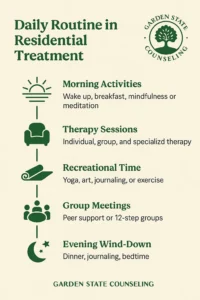Sobriety can feel surprisingly quiet.
The chaos may have stopped, but now you’re left with the stillness—and that can feel lonelier than expected. You did the hard thing: you stopped using. But now what? If you’re wondering whether residential treatment might be the next right step, you’re allowed to ask. You’re allowed to not know. And you’re allowed to want more support without having to fall apart first.
What is residential treatment, really?
Residential treatment is a live-in level of care where you get structured, full-time support for your mental health and/or addiction recovery. It’s not a punishment or a last resort. It’s a place where you don’t have to carry everything by yourself anymore.
At Garden State Counseling Center in Paramus, New Jersey, residential treatment means:
- Daily therapeutic support
- Group and individual therapy
- Healthy meals and sleep routines
- Connection with others who get it
- A space to slow down, without falling behind
It’s not about “fixing” you—it’s about holding you through the part of healing that’s hardest to do alone.
Is residential treatment only for people who’ve hit rock bottom?
Nope. That’s one of the biggest myths we hear. The truth is, many people enter residential care not because they’re in crisis—but because they’re trying to prevent one.
If you’re newly sober and finding it hard to cope, you don’t have to wait until things get worse. Maybe you’re struggling to get out of bed. Maybe you feel like you’re just “white-knuckling” it through the day. Maybe the loneliness is louder than any craving ever was.
You don’t have to hit rock bottom to deserve real support. Early intervention is still intervention—and often, it’s more effective.
What if I feel too emotionally fragile to start something intense?
That’s actually one of the most common reasons people do choose residential care.
Early recovery often comes with emotional whiplash. You may feel raw, overstimulated, under-supported, or like the smallest thing could send you spiraling. That’s not weakness. That’s your nervous system trying to recalibrate without the buffer substances used to provide.
Residential treatment isn’t about pushing through. It’s about creating a space where you can fall apart safely, rebuild gently, and learn what stability actually feels like.
There’s no “readiness” test. Just willingness—and even that can be small and shaky.
Will I lose my job or fall behind in life if I go?
This is such a real fear. And the answer depends on your specific situation—but you have more protections than you might think.
Many workplaces allow short-term leave for mental health or substance use treatment. Laws like the Family and Medical Leave Act (FMLA) may protect your job while you seek care. And in many cases, we can work with your employer or help you find flexible timing.
But let’s get real for a second: you can’t build a future if you’re barely surviving the present.
Residential care isn’t a step back. It’s a pause that lets you catch your breath—so you can actually move forward.

What happens when residential treatment ends?
No one gets tossed back into the world with a pat on the back. A good program starts preparing you for life after treatment from the very beginning.
At Garden State, discharge planning is part of the process:
- We help you step down into IOP or outpatient care
- We guide you in creating a sustainable routine
- We connect you with community supports
- We make sure you leave with people, not just paperwork
You’re not going back to life “on your own.” You’re moving into a next step—with skills, support, and a plan.
How do I know if I’m “sick enough” for this?
This question breaks our hearts because it’s built on the lie that you have to earn care by suffering enough.
You don’t.
If you’re:
- Dreading each day in early recovery
- Feeling like everyone’s cheering you on but you feel hollow inside
- Going through the motions but deeply disconnected
- Numb, anxious, lonely, or scared to be alone with your own thoughts…
That’s enough.
Residential treatment isn’t about meeting a crisis threshold. It’s about responding to a human need for help, safety, and connection. That need alone is valid. So are you.
“I didn’t think I belonged in residential treatment. But it turned out, I belonged in a place where I didn’t have to explain my pain to be understood.”
– Former Client, 2023
📞 Still thinking about it? That’s okay.
If any part of you is wondering whether residential treatment might help—that’s worth listening to. There’s no pressure, just a conversation.
Call (201) 632 5716 or visit our residential treatment program page to learn more about our services in Paramus, New Jersey.





